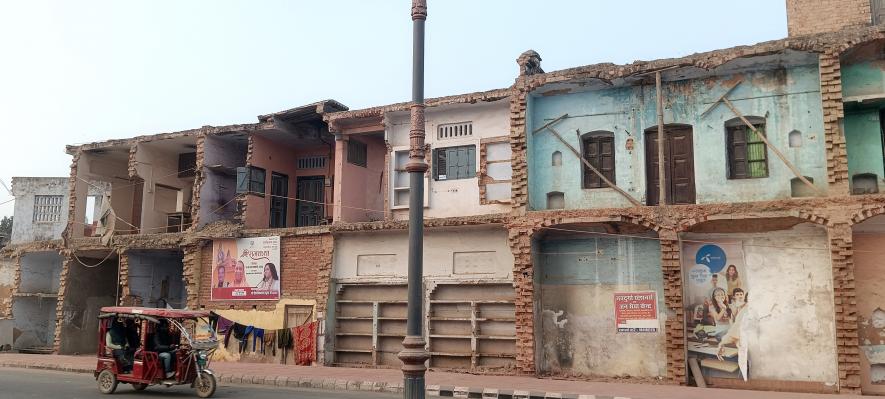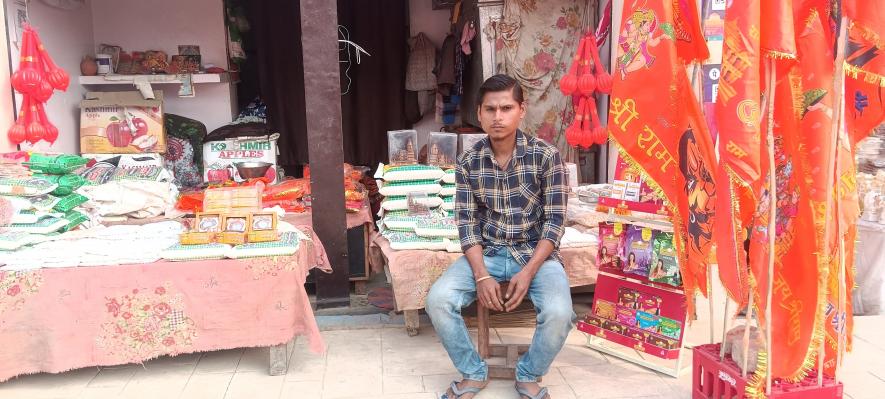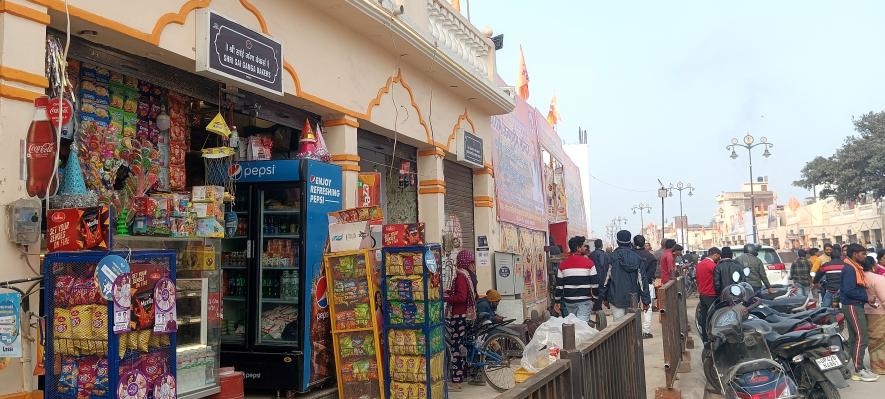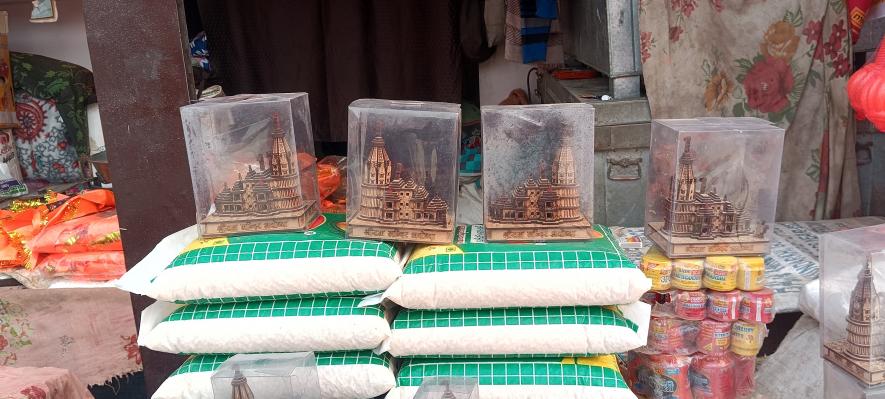Ayodhya: All Eyes Skyward at Grand Temple; Shopkeepers Left With Rubble Below

Ayodhya: Moving towards Ram Path Marg, the arterial road leading to the Ram Temple, one can see demolished old houses and shops on both sides of the road. Hidden behind the cutouts featuring Prime Minister Narendra Modi and Lord Ram, several shopkeepers and families say they have lost their daily earnings after their roadside shops and houses were demolished by the authorities because of the road widening project.
Amid preparation for the Ram temple consecration ceremony in Ayodhya on January 22, shops witnessed a beeline of devotees in huge unprecedented numbers, the shopkeepers said. However, a feeling of anxiety is visible on Neeraj’s face while he negotiates with a customer.
Neeraj Singh (27) sold a portrait of Lord Ram worth Rs 250 to the customer for Rs 155 because the customer had that much money.
“We have been selling pooja items for four generations here at Ram Path. Thirty feet of my house was demolished during land acquisition for the road widening project. A compensation of Rs 2.85 lakh only was given to us even though the circle rate has gone up by more than 10 times since the verdict for building a Ram temple was announced by the Supreme Court in 2019. We should have been given at least Rs 17 lakh at the current circle rate to be fair. Building the Ram Temple will only be beneficial for us shopkeepers if our business runs successfully,” Singh told NewsClick.

There are half-broken shops on the 13-km stretch of what is now called Ram Path—many run for generations by the same family. Shop owners have two complaints: firstly, the compensation given to them was far below the prevailing market rate and secondly, they worry about having to repay the loans they have taken from their relatives to extend the shops after demolition. While the compensation stands at six times the circle rate, after the Supreme Court of India’s verdict on the Ram Janmbhoomi Title suit in 2019, the market rate has gone up by more than 10 times the circle rate.
‘Govt Bulldozed Our Livelihoods, Hopes’
Over 1100 shops and houses have been demolished on the 13-km stretch on Ram Path. Ravi Chetrpal, who runs a bakery shop barely 70 meters from Hanuman Temple, has given up more than 90% of his shop for the project. “I had a 25-foot shop, of which 20 feet was demolished by the authorities. I received only Rs 1 lakh as compensation from the government. Unable to operate a shop within the remaining five feet, I paid Rs 10 lakh as pagadi (advance money) to extend my shop by 10 feet to the Hanuman Garhi Trust,” he claimed.
The Hanuman Garhi Trust owns most of the shops in the temple’s vicinity.
Ravi, a native of Ayodhya, was upset about how he would return the money he had borrowed from his relatives and friends.

“I have been given Rs 1 lakh compensation from the government and I had to pay Rs 10 lakh to expand the shop. What did we gain?” he questioned.
This isn't just Ravi's story; all the shopkeepers along Ram Path share a similar narrative, expressing dissatisfaction with the lack of fair compensation.
The narrow road leading to Hanuman Garhi, dotted by shops on both sides, is now around 14 metres wide. Shops have been half-demolished to pave the way for the 800-metre Bhakti Path. The sound of the ringing of temple bells and conch shells echoes in the air. However, its juxtaposition to the rubble and lacklustre faces of those who are dealing with the aftermath of the demolition is striking.
“It was everyone's dream that Ram Temple should built, but at the cost of demolishing our houses? Even God himself would not want this. Where should we go with the broken houses and shattered dreams?” asked Divya, with her voice choking and tears rolling down her face.
Raghaw Saini, a utensils seller, said three of his four shops were demolished as the administration tried to widen the road leading to the temple and his sales have come down heavily because of losing these locations.
“We were paid Rs 20 lakh compensation for both the shops, but the Hanuman Garhi trust, which allocates lands, is now demanding Rs 22 lakh for allotting us a single shop in another location which we cannot afford. Most others cannot afford it as we are hand-to-mouth people,” Saini told NewsClick.
The serpentine lanes of Ayodhya today have been engulfed in the loud noise of machinery and earthmovers, symbolising the ongoing transformation of an ancient city into a sprawling modern pilgrimage center.

Mohan Provision Store, situated next to the Post Office Tiraha, is regarded as the largest ration shop in the city. Recently, it relocated away from the main market. Ajay Maheshwari, the current proprietor, said that this shop has been operated by his family for three generations, spanning approximately 80 years. The compensation received for the shop is significantly below its assessed value. Despite this, in an effort to preserve his ancestral business, he was compelled to open a shop on the street adjacent to the police station.
Trivedi Library, right in front of the Kotwali, was a famous shop for religious books in the city. Its owner Nand Kishore Trivedi says that the entire shop was gone in one stroke. Under compulsion, he is running his business in a rented shop in Rani Bazaar. He said that many people used to come to his shop from outside the town; now, it would not be possible to give the address of the new shop to everyone.
Mangal and Gayatri Medical Stores were located opposite each other near the Ayodhya Hanumangarhi intersection, both now operating their businesses from their homes. Deep Narayan Gupta, the proprietor of Mangal Medical Store, is currently grappling with depression following the demolition of his decade-old house. Gupta said he purchased the shop about 15 years ago in very difficult circumstances, and it has now been lost in a flash. Lacking the courage to buy another one, he is compelled to earn his living by opening a shop in his house on a street near Tedhi Bazaar.
“We are not against the construction of the temple, but we should have been given sufficient compensation so that our businesses don’t suffer. But who cares for the poor when the whole country is singularly focused on Ram? I hope Lord Ram gives wisdom to the government to understand the pain felt by poor people seeing their houses being demolished,” Sugriv, a local, told NewsClick.
NewsClick visited several shopkeepers, most of whom were originally situated on the front road near the temple premises. Following the demolition, these shops were relocated to narrow lanes, making it a challenging task for any customer to reach them.
However, the businessmen also hold hope for the Ram Mandir, anticipating that business will flourish rapidly once it opens for devotees.
Get the latest reports & analysis with people's perspective on Protests, movements & deep analytical videos, discussions of the current affairs in your Telegram app. Subscribe to NewsClick's Telegram channel & get Real-Time updates on stories, as they get published on our website.
























